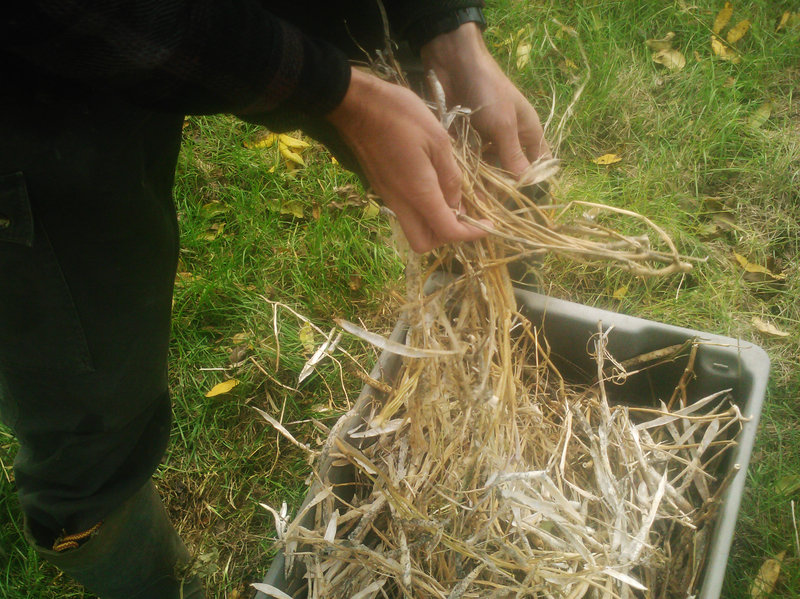A Growing Need for Seed Growers

Community seed projects are happening everywhere this year! They're growing fast, and they need local seed savers to help.
If you have experience saving seeds, there are many ways you can get involved in a seed collection project – in your community, or with Seeds of Diversity's national Seed Library. When it comes to seeds, quality is more important than quantity, so it doesn't matter whether your garden is big or small. Any local seed project can only be as good as the seeds that go into it, so what really matters is that your seeds are true-to-type and vigorous.
Here are a few examples of projects that need more seed savers:
Community seed libraries and seed banks have sprouted all across the country during the past few years. Inspiring projects at community gardens, public libraries, university campuses, and food hubs have brought seeds and seed issues into the spotlight. If there is a community seed library in your area, you can be sure that they're looking for more seed savers – get in touch with them and offer your help to grow seeds for their collection.
“Community members donated seeds to get [the seed library] started, but available volunteers to grow the seeds out were limited.”
“... we have adequate resources, it is more a question of experienced seed savers on hand to train more volunteers in the field.”
“To date, we have only had a few volunteers to help with the seed library as we ran a pilot program ... [we] will be looking into more volunteer and staff training as we move forward.”
- comments from Community Seed Libraries
With any seed collection, the work of gathering seeds, indexing them, and placing them in good storage is always the first step, but it's only 10% of the job. The rest is growing fresh seeds so older stock doesn't die out, multiplying the seeds so some can be distributed to growers and used for the collection's intended purpose, and making sure there are enough seeds to supply future needs and back-ups.
The good news is that anyone with access to even a little bit of land can help. Even a small jar of seeds can make a big difference to a community seed library.
Our own national Seed Library collection has grown so much that we need more growers to help maintain it by planting old seeds, and saving new seeds. We typically ask volunteers to keep up to half of their harvest, and give back the rest for freezer storage in our non-profit collection. Quality matters – the seeds we keep in our collection must be grown with proper isolation, and they have to germinate well – but quantity doesn't matter as much. Often, we can only provide growers with a minimal population anyway: 40 beans for instance, so we aren't asking anyone to plant more than a short row.
Seeds of Diversity's Seed Library is a back-up collection of our members' rare seeds. We have great seed growers, but every year there are varieties that members can't keep offering, and they would fall through the cracks if we didn't collect them. As it happens, we have samples of seeds no one is growing anymore. If you can confidently grow good-quality seeds, but only have a little space or time, you can help a lot by growing fresh seeds of a rare variety!
Commercial seed vendors and market gardeners are eager to find people who can produce high-quality AND high-quantity seed. There are some great Canadian-adapted seed varieties that aren't available in large enough quantities for farm use. We're trying to change that through our new Vegetable Seed Producers Network, a project for experienced seed producers who want to grow larger quantities of seeds for commercial production. Quality is of the utmost importance, because commercial buyers need seed that they can trust. Check out the article in this e-bulletin, and if you can produce high-quality AND high-quantity seed, get involved!
As we look back at the growth of seed projects in 2014, it's amazing to see how many new activities and new initiatives there are. But as we look ahead at 2015, the greatest need for those new activities is obvious: we'll need more people to produce seeds, in any amount, at the highest quality. What really matters is to do the job well because any local seed project can only be as good as the seeds that go into it.
Use your skill to make a difference. Contact us at growers@seeds.ca
Tell us which species of seeds you have experience saving, and how much land and time you can devote. Are you interested in rescuing an endangered variety (growing a small number of older seeds to make a small number of fresh seeds), multiplying seeds for seed libraries, or joining our Vegetable Seed Producers Network (growing a larger quantity of market-demand seeds for commercial sale).
You can learn the basics by downloading our free handouts at seeds.ca/diversity/seedsaving and graduate from there to our popular handbook How to Save Your Own Seeds.
We can also offer education and training for seed savers of all levels of experience. The Bauta Family Initiative on Canadian Seed Security sponsors training workshops for experienced and intermediate-level seed growers. See www.seedsecurity.ca to learn more.
Whether you have a farm field, or a tiny garden, there is a worthwhile seed-saving project waiting for you. Let us help you find it.
Not yet a member?
An annual membership to Seeds of Diversity gives you access to our seed exchange, seed grow-out programs, and our online news.

We depend on donations to do our work.

Thank you for your support!
